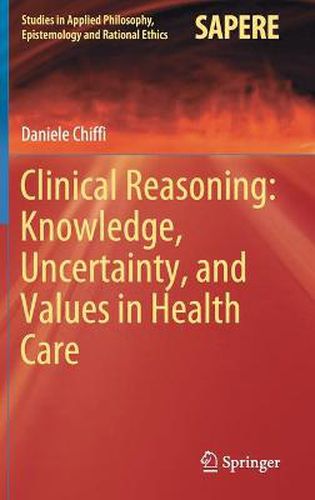Readings Newsletter
Become a Readings Member to make your shopping experience even easier.
Sign in or sign up for free!
You’re not far away from qualifying for FREE standard shipping within Australia
You’ve qualified for FREE standard shipping within Australia
The cart is loading…






This title is printed to order. This book may have been self-published. If so, we cannot guarantee the quality of the content. In the main most books will have gone through the editing process however some may not. We therefore suggest that you be aware of this before ordering this book. If in doubt check either the author or publisher’s details as we are unable to accept any returns unless they are faulty. Please contact us if you have any questions.
This book offers a philosophically-based, yet clinically-oriented perspective on current medical reasoning aiming at 1) identifying important forms of uncertainty permeating current clinical reasoning and practice 2) promoting the application of an abductive methodology in the health context in order to deal with those clinical uncertainties 3) bridging the gap between biomedical knowledge, clinical practice, and research and values in both clinical and philosophical literature. With a clear philosophical emphasis, the book investigates themes lying at the border between several disciplines, such as medicine, nursing, logic, epistemology, and philosophy of science; but also ethics, epidemiology, and statistics. At the same time, it critically discusses and compares several professional approaches to clinical practice such as the one of medical doctors, nurses and other clinical practitioners, showing the need for developing a unified framework of reasoning, which merges methods and resources from many different clinical but also non-clinical disciplines. In particular, this book shows how to leverage nursing knowledge and practice, which has been considerably neglected so far, to further shape the interdisciplinary nature of clinical reasoning. Furthermore, a thorough philosophical investigation on the values involved in health care is provided, based on both the clinical and philosophical literature. The book concludes by proposing an integrative approach to health and disease going beyond the so-called classical biomedical model of care .
$9.00 standard shipping within Australia
FREE standard shipping within Australia for orders over $100.00
Express & International shipping calculated at checkout
This title is printed to order. This book may have been self-published. If so, we cannot guarantee the quality of the content. In the main most books will have gone through the editing process however some may not. We therefore suggest that you be aware of this before ordering this book. If in doubt check either the author or publisher’s details as we are unable to accept any returns unless they are faulty. Please contact us if you have any questions.
This book offers a philosophically-based, yet clinically-oriented perspective on current medical reasoning aiming at 1) identifying important forms of uncertainty permeating current clinical reasoning and practice 2) promoting the application of an abductive methodology in the health context in order to deal with those clinical uncertainties 3) bridging the gap between biomedical knowledge, clinical practice, and research and values in both clinical and philosophical literature. With a clear philosophical emphasis, the book investigates themes lying at the border between several disciplines, such as medicine, nursing, logic, epistemology, and philosophy of science; but also ethics, epidemiology, and statistics. At the same time, it critically discusses and compares several professional approaches to clinical practice such as the one of medical doctors, nurses and other clinical practitioners, showing the need for developing a unified framework of reasoning, which merges methods and resources from many different clinical but also non-clinical disciplines. In particular, this book shows how to leverage nursing knowledge and practice, which has been considerably neglected so far, to further shape the interdisciplinary nature of clinical reasoning. Furthermore, a thorough philosophical investigation on the values involved in health care is provided, based on both the clinical and philosophical literature. The book concludes by proposing an integrative approach to health and disease going beyond the so-called classical biomedical model of care .